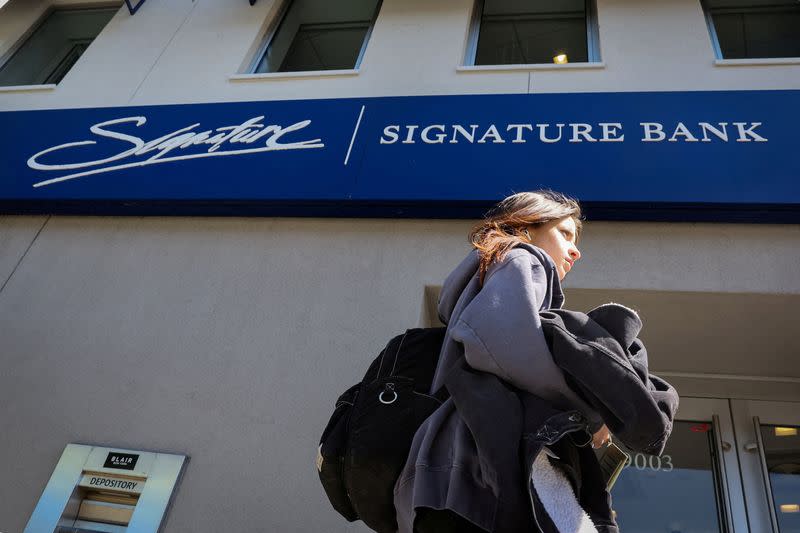Signature Bank failure due to 'poor management,' US FDIC report says

(Reuters) - Last month's failure of New York-based Signature Bank was caused by "poor management" and a pursuit of "rapid, unrestrained growth" with little regard for risk management, the Federal Deposit Insurance Corporation said on Friday in a report detailing its supervision and regulation of the regional bank.
Bank management and its board chased growth and deposits without "developing and maintaining adequate risk management practices and controls appropriate for the size, complexity and risk profile of the institution," according to the 63-page report.
Just as critically, the FDIC said its supervisory staff was inadequately resourced for the task of overseeing the bank, an issue it flagged as a significant impediment more widely to its mission of maintaining the safety and soundness of the banking system.
Since 2020, an average of 40% of positions in the FDIC's large bank supervisory staff in the New York region were vacant or filled by temporary employees, the report said.
Regulators closed Signature on March 12, two days after Silicon Valley Bank was shuttered following $42 billion in deposit outflows in a single day. The same day SVB failed, Signature lost 20% of its total deposits in a matter of hours, FDIC Chair Martin Gruenberg has said.
The Federal Reserve issued a report detailing its supervision and regulation of SVB earlier on Friday.
Similar to SVB, Signature examiners reported weak corporate governance practices and failures by bank management to address shortcomings identified by supervisors, including the firm's reliance on uninsured deposits.
Signature's leadership "rejected examiner concerns about the stability of uninsured deposits as late as noon EST on March 10, 2023," the FDIC said, adding that management "failed to acknowledge the severity of the problem until a run started" later that afternoon.
Flagstar Bank, a subsidiary of New York Community Bancorp, agreed to buy substantially all of the deposits and loans from Signature in the week following its closure. The FDIC estimated the deal would cost its Deposit Insurance Fund approximately $2.5 billion.
Signature had $110.36 billion in assets and $88.59 billion in deposits at the end of last year, according to New York state's Department of Financial Services. Like SVB, Signature relied heavily on uninsured deposits and experienced a boom in growth between 2019 and 2020, when its assets grew 64%, according to Gruenberg.
U.S. officials invoked a "systemic risk exception" to back all deposits, even those above the amount insured by the FDIC, at both Signature and SVB in an effort to prevent more bank runs.
CRYPTOCURRENCY SECTOR DEPOSITS
Signature was a commercial bank with private client offices in New York, Connecticut, California, Nevada and North Carolina, and had nine national business lines including commercial real estate and digital asset banking.
As of September, almost a quarter of its deposits came from the cryptocurrency sector, but the bank announced in December that it would shrink its crypto-related deposits by $8 billion.
Signature's remaining deposits from crypto clients were not part of the rescue deal arranged with Flagstar.
The New York State Department of Financial Services pushed back on speculation from the crypto industry as well as Signature board member and former U.S. Representative Barney Frank's assertions that the regulator closed the bank due to its involvement in digital assets.
The agency said Signature failed to provide reliable and consistent data as withdrawal requests ballooned over the weekend and made the decision to close the bank based on its ability to do business in a safe and sound manner the next day.
Signature had a long-standing relationship with former President Donald Trump and his family, providing Trump and his business with checking accounts and financing several of the family's ventures. The bank cut ties with Trump in 2021 following the deadly Jan. 6 riots on Capitol Hill, and urged Trump to resign.
(Reporting by Hannah Lang in Washington; Editing by Dan Burns and Paul Simao)

 Yahoo Finance
Yahoo Finance 